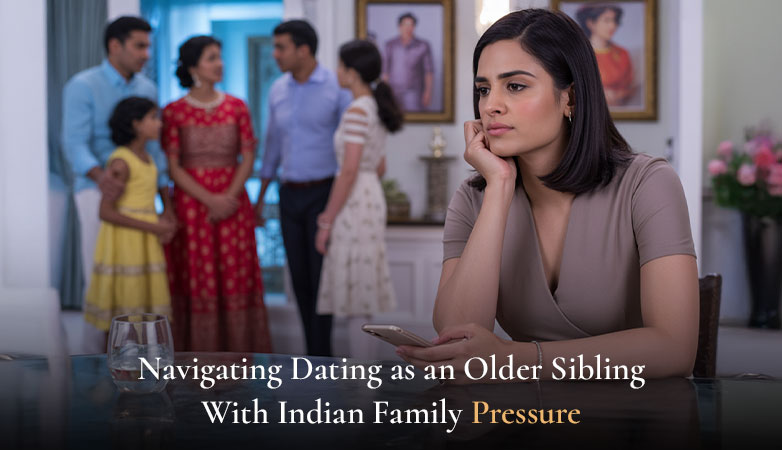Indian family pressure on elder siblings doesn’t come with warning signs. It just shows up, quietly, insistently, when you try to make space for your own life.
Especially if you’re dating.
If you’re the eldest, you’re not just choosing a partner. You’re navigating family expectations, sibling dynamics, and what-will-people-say whispers, all at once.
The truth? Indian family pressure on elder siblings works like an emotional leash. You think you’re in control, moving forward, but just when things feel real or right, it pulls you back.
And yes, it tugs hardest when love enters the picture.
Table Of Contents
- Understanding the cultural setup in Indian households
- Why elder siblings are burdened with responsibility
- Gender bias and expectations from firstborn daughters
- How family pressure affects mental health
- Financial obligations and sacrifice of personal goals
- The unspoken cost of parentification in Indian families
- Boundaries, resentment, and sibling dynamics
- Changing perceptions in urban Indian families
- Reclaiming independence without guilt
- Conclusion
Understanding The Cultural Setup In Indian Households
Let’s call it what it is: a quiet contract that every eldest child signs, without realizing it.
In most Indian families, the foundation isn’t built on individual freedom, it’s built on collective responsibility. And at the core of that setup is a clear message:
The family comes first.
So when you’re the eldest, it begins early.
- You’re asked to take care of younger siblings
- Mediate when parents argue
- Sacrifice outings because “you’re older and should understand”
These aren’t random chores, they’re early signals of eldest child responsibilities taking root.
And slowly, without being told directly, you learn: your choices must benefit the unit, not just you.
In this kind of family dynamics in Indian culture, love doesn’t feel like your own journey, it feels like a group project.
Who you date, when you date, and how you date?
It’s all filtered through invisible layers: religion, caste, social reputation, even your siblings’ timelines.
That’s how Indian family pressure on elder siblings shows up.
You’re not just choosing a partner, you’re expected to choose someone the whole family can present to the world with pride. Someone who won’t disrupt the carefully curated family image.
Someone who won’t make the younger ones “think they can do the same.”
Why elder siblings are burdened with responsibility
A 2020 study published in the Indian Journal of Social Psychiatry found that firstborns in collectivist cultures bear significantly more responsibility for family well-being than their younger siblings, both emotionally and financially.
This burden creates internalized pressure to perform, protect, and prioritize.
Eldest children often hear:
- “You have to set an example.”
- “Your younger siblings are watching you.”
- “You can’t think only about yourself.”
Dating while carrying this script means guilt is inevitable, especially if your relationship doesn’t fit the traditional mold.
Gender bias and expectations from firstborn daughters
The emotional burden of elder siblings is amplified for women.
Enter: eldest daughter syndrome.
Sociologist Dr. Renu Thakur notes that firstborn Indian daughters are often ‘parentified’ as early as age 10, especially in families with working parents or emotionally unavailable fathers.
They become second mothers, without consent, without compensation, and without an exit.
When these daughters start dating, they’re often accused of being “too independent,” “too picky,” or “too distracted.”
What others don’t see is how many emotional fires they’ve already extinguished before even meeting someone new.
How family pressure affects mental health
Indian family pressure on elder siblings isn’t just a logistical challenge. It’s an emotional one. And the effects don’t just fade with distance, adulthood, or even therapy. They sit in your nervous system.
The emotional burden of elder siblings starts young and rarely lets up. You’re taught to put others first. You’re praised for being responsible. And somewhere along the way, your own emotional needs start to feel… optional.
Research says it out loud:
According to a study in the Journal of Family Psychology, constant exposure to high family expectations, especially for firstborns, leads to:
- Persistent anxiety
- Chronic stress
- Lower satisfaction in adult romantic relationships
Why? Because when you’re always monitoring the emotional temperature at home, you never really learn how to advocate for your own needs, let alone in a relationship.
Enter: Emotional parentification
A term that sounds clinical but feels painfully familiar to many of us.
It’s when the eldest child is expected to meet the emotional needs of the parents, being their confidant, peacekeeper, or emotional support system before they’re even out of school.
And in adulthood?
You might:
- Over-function in relationships
- Feel guilt for choosing yourself
- Struggle with boundaries or feel unsafe expressing needs
The impact of birth order on mental health is especially visible in eldest children who often bypass their own developmental needs to meet family demands.
Financial obligations and sacrifice of personal goals
Another layer? Money.
Many eldest siblings contribute to family finances, paying off home loans, funding siblings’ education, or supporting retired parents. A LiveMint report from 2023 found that 42% of Indian-origin firstborns in the U.S. had sent money home in the last 12 months.
What gets sacrificed in this process?
- Relocation opportunities
- Advanced education
- Long-distance relationships
- Time to explore compatibility in dating
Love becomes a luxury. Or worse, a negotiation measured against cost to the family.
The unspoken cost of parentification in Indian families
Parentification in Indian families isn’t a term you hear at the dinner table. But its symptoms echo loudly.
It shows up when:
- You cancel a date because your sibling had a fight with their partner.
- You delay proposing because your parents are “still not ready.”
- You second-guess your feelings, wondering: “Will my choice disappoint them?”
Clinical psychologist Dr. Shefali Chopra calls it emotional inheritance.
The silent expectation that the eldest will carry the weight of family legacy, resolve intergenerational trauma, and still build a life of their own.
Boundaries, resentment, and sibling dynamics
When elder siblings finally set boundaries, delaying financial help, choosing a partner against the family’s wishes, or simply moving out, the household can erupt.
This is the dark side of sibling hierarchy in Indian households. The resentment isn’t always overt. Sometimes it’s silent.
Sometimes it’s withdrawal. Sometimes it’s that quiet statement at a family gathering:
“You’ve changed.”
But as therapist Anita Vasudevan puts it, “Saying ‘no’ is not rebellion. It’s repaired. Not for the family, but for yourself.”
Changing perceptions in urban Indian families
Thankfully, some winds are shifting.
Urban Indian families, especially those with global exposure, are beginning to unlearn rigid traditional roles of elder children.
There’s greater understanding around autonomy, choice, and the need for interdependence, not martyrdom.
Social media, therapy, and global conversations around mental health are helping normalize the idea that the eldest deserves their own life.
Even arranged matchmaking platforms have adapted, valuing individual compatibility over just familial alignments.
Reclaiming independence without guilt
To reclaim your identity, and date meaningfully, you don’t need a full family rebellion. But you do need clarity and courage.
Here’s where to begin:
- Name the role: Acknowledge where your elder sibling identity ends and where you begin
- Communicate openly: Have structured conversations with parents and siblings, setting limits with empathy
- Normalize therapy: For yourself and, if possible, for your family
- Date intentionally: Choose partners who respect your background but don’t expect you to sacrifice yourself for it
- Redefine success: Not as obedience, but as emotional balance and relational fulfillment
If you’re struggling to break out of this pattern, the right help is only a click away.
Conclusion
Indian family pressure on elder siblings isn’t just about tradition, it’s about identity, duty, and love, all tangled into one.
Dating as the eldest child means you’re often trying to love someone else while still being a caretaker to everyone around you.
But you deserve a partnership that honors you, not just your title in the family tree.
You deserve a relationship not rooted in guilt, but in joy.
You’re not just dating.
You’re juggling:
- The emotional burden of elder siblings
- The traditional roles of elder children
- And the classic: “What will people say?”
Especially if you’re the eldest daughter, the pressure hits differently. You’re expected to lead, provide, protect, and still somehow fall in love on schedule, with someone your family approves of.
But here’s the thing:
You’re more than the label of firstborn.
More than the fixer, the provider, the blueprint.
You deserve to date without carrying your entire family’s legacy on your shoulders.
You deserve a partner who sees you, not just your role in the sibling hierarchy.
And if you’re ready to reclaim your dating life, with intention and independence, Sirf Coffee can help you find someone who actually gets it. Someone who values your journey, not just your family title.
Curated matchmaking, for people who’ve carried too much for too long.
Explore Sirf Coffee’s human-led approach to dating, because your story deserves more than algorithms.
FAQs
What emotional toll does family pressure take on elder siblings?
It can lead to anxiety, chronic stress, and identity confusion, often affecting personal relationships and life choices.
Are eldest daughters expected to parent younger siblings?
Yes. In many Indian families, eldest daughters experience ‘parentification’, taking on caregiving roles usually reserved for parents.
How can elder siblings handle conflicting personal and family priorities?
Through boundary-setting, clear communication, therapy, and by redefining success beyond just family approval.
Is it common for firstborns to suppress their aspirations?
Unfortunately, yes. Many eldest siblings delay or forgo career moves, education, or relationships to prioritize family needs.


